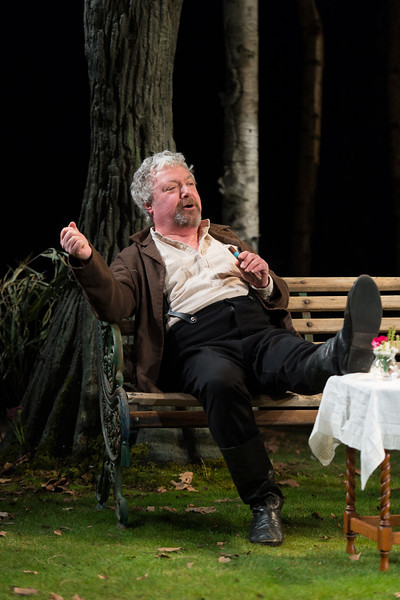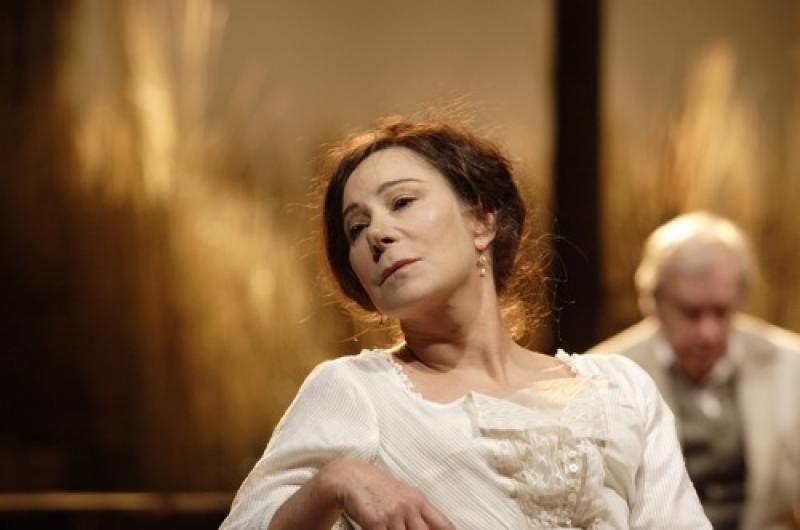If only there were more Chekhov! Theatregoers in England, for whom Anton Pavlovich is little short of a god, must have wished this often enough. The handful of great plays come round almost as frequently as Shakespeare. Yet, as well as a couple of lesser plays and some crude farces, Chekhov wrote almost 600 short stories, counting the comic squibs with which he helped to support his family as a very young man. Some of the more mature ones are masterpieces, works of extraordinary imagination and psychological insight. He occasionally adapted them himself and others have done since. Now William Boyd has boldly melded two, "My Life" and "A Visit to Friends", to make Longing, his first play for the theatre.
In "My Life" a young man defies his bourgeois family to become a manual labourer. "A Visit to Friends", written in Nice in 1897 while Chekhov was convalescing after a tubercular haemorrhage, contains the germ of The Cherry Orchard: three sisters, whose inheritance has been wasted by the drunken husband of one of them, are forced to sell their estate to a man of lower class.
Anton Pavlovich as commitment phobe is not the most compelling figure
Boyd sees hints of Chekhov himself in the protagonist of "A Visit to Friends". Encouraged to marry the beautiful youngest sister to rescue the family's fortunes, Kolia, a successful Moscow lawyer, slips away furtively. Chekhov had a vigorous sex life, enjoying many affairs and frequently visiting brothels, before eventually marrying the actress Olga Knipper a few years before his death at 44. But Anton Pavlovich as commitment phobe is not the most compelling figure. Apart from his literary brilliance, he was also a doctor who generously treated the poor and even made the punishing journey across Siberia to Sakhalin to investigate conditions at the penal colony there. Kolia's idea of a philosophical position is to repeat "All things pass".
 Doctors figure as attractive if melancholy characters in the plays, of course. Here the doctor is a woman, an old flame of Kolia's who is still in love with him. As a dedicated medical professional, Varia makes an unusual Chekhovian heroine, but in her Tamsin Greig finds something close to the spirit of Chekhov. She successfully combines a wistful sense of personal loss (although Varia's professional life in cholera outbreaks is far from wasted) with an ironic, self-deprecating humour. Iain Glen as Kolia has less to bite on, especially compared with his heartbreaking Vanya, both soulful and rumbustious, at the Print Room last year.
Doctors figure as attractive if melancholy characters in the plays, of course. Here the doctor is a woman, an old flame of Kolia's who is still in love with him. As a dedicated medical professional, Varia makes an unusual Chekhovian heroine, but in her Tamsin Greig finds something close to the spirit of Chekhov. She successfully combines a wistful sense of personal loss (although Varia's professional life in cholera outbreaks is far from wasted) with an ironic, self-deprecating humour. Iain Glen as Kolia has less to bite on, especially compared with his heartbreaking Vanya, both soulful and rumbustious, at the Print Room last year.
Sergei, the wastrel brother, despite Alan Cox's best efforts, remains a one-note character. Misail (William Postlethwaite), the architect's son who attempts to embrace peasant life, is barely sketched in as a misfit who is to be unhappily yoked to the daughter of Dolzikhov, purchaser of the estate. His fiancee (Catrin Stewart) is here a broad-brush prototype for Natasha in The Three Sisters. The peasants are generally presented crudely, with John Sessions (pictured above right) as a chubby "greasemonkey" relishing his new-found position as landowner. The sisters' snobbery is seemingly justified, although Radish (Tom Georgeson) has an earthy moral certainty and a satisfyingly sharp tongue.
Nina Raine's animated production is beautiful to look at, with Lizzie Clachan's birch-surrounded summer house subtly lit by James Farncombe. Three years ago, Hampstead hosted a week of events as part of the campaign to save Chekhov's house in Yalta. The short stories figured significantly then. While Boyd's dramatisation does not add up to a new towering Chekhov drama, it makes for a pleasant enough evening and provides another approach to the stories, especially "A Visit to Friends", which is less readily available than many of the others.
MORE CHEKHOV ON THEARTSDESK
The Cherry Orchard, National Theatre (2011). Zoë Wanamaker (pictured below) shines in Howard Davies's murky production of Chekhov
The Cherry Orchard, Sovremennik, Noël Coward Theatre (2011). Russians soar in third, and final, offering of their first-ever London season
Uncle Vanya, The Print Room (2012). Iain Glen stars in a version of Chekhov at his most tenderly intimate
A Provincial Life, National Theatre Wales (2012). Moments of visual beauty punctuate a Chekhov adaptation that struggles to find its focus
Three Sisters, Young Vic (2012) Benedict Andrews' energetic update is stronger on ensemble work than individual performances
 Uncle Vanya, Vakhtangov Theatre Company (2012). Anti-naturalistic Russian Chekhov buries humanity under burlesque and mannerism
Uncle Vanya, Vakhtangov Theatre Company (2012). Anti-naturalistic Russian Chekhov buries humanity under burlesque and mannerism
Uncle Vanya, Vaudeville Theatre. Anna Friel, Laura Carmichael and Ken Stott shine bright in Lindsay Posner's production of Chekhov's drama
The Cherry Orchard, Young Vic (2014). Katie Mitchell delivers Chekhov's masterpiece with devastating power
Uncle Vanya/Three Sisters, Wyndham's Theatre (2014). Quiet truth in finely observed ensemble Chekhov from the Mossovet State Academic Theatre
Winter Sleep. Turkish master Nuri Bilge Ceylan’s Cannes Palme d'Or winner, based on Chekhov short stories, is huge in every sense
The Seagull, Regent's Park Open Air Theatre (2015). Strikingly staged Chekhov continues a strong season in the park
Uncle Vanya, Almeida Theatre (2016). Robert Icke's lenghty Chekhov revival/reappraisal is largely a knockout
Young Chekhov, National Theatre (2016). Jonathan Kent's three-play Chekhovathon builds to a shattering climax
Wild Honey, Hampstead Theatre (2016). Early Chekhov begins strongly then falls away















Add comment